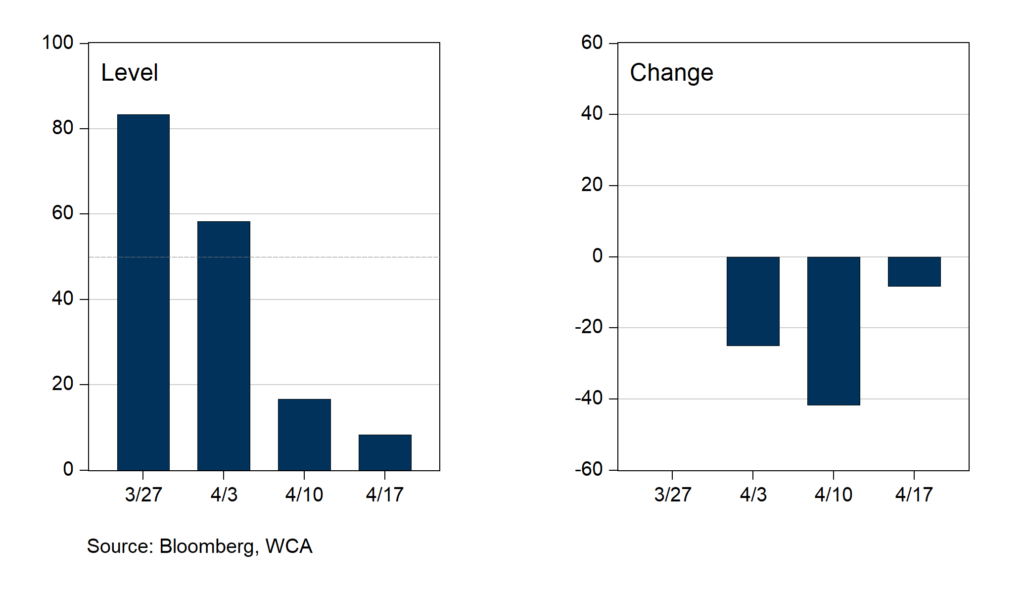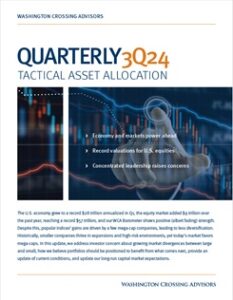Tracking Recovery
Stocks rallied last week on talk of reopening the economy and the S&P 500 is about half way back to February highs. The lockdown is helping to slow cases of coronavirus, but the economy is taking a beating as a result. Judging by recent data, the U.S. economy is likely contracting at an annualized pace in the range of -15% to -22% (chart, below). Over 10 million Americans filed for unemployment insurance in the past month. Estimates of potential job losses range from 23 million (Goldman Sachs) to 47 million (St. Louis Federal Reserve). The speed of the present downturn seems to be without precedent.
Deep Slide in Output Underway

The Clock is Ticking
A race against the clock has begun, lest acute economic illness becomes chronic. While the onset of the crisis was dramatic, a sustained and sizable loss of income could pinch in other ways. Increased defaults from local governments, hospitals, airports, and stadiums are one concern. The lack of traffic in retail outlets and defaults on mortgage payments are another. Potential banking system losses are another. And while government loan programs to help small business pay employees, taxes, and landlords is good, little is happening to drive business in the front door. To achieve that, it is essential that economic activity restarts. If not, May and June could be difficult months.
Plotting a Course
We do not know whether we are on the “V-Shaped” or “U-Shaped” path to recovery. To know which road we are on, we need to collect and analyze data in real-time. Our usual WCA Fundamental Conditions Barometer, which we rely on in normal times, measures data only monthly. The time compression of the past month necessitates a weekly review at this time. To accomplish this, we will focus on three areas: 1) coronavirus trends; 2) financial market conditions; and 3) real economic activity.
Coronavirus Trends
In the past week through Thursday, the number of U.S. cases and deaths rose again. Cases rose by 205,298 to 671,331 and deaths rose by 16,594 to 33,284. Yet social distancing and testing measures are helping. The percent change in new cases and deaths, for example, both fell again last week.
While cases and deaths are rising by the thousands each week, the pace of growth is flattening.
Financial Conditions
Keeping in mind Moody’s estimated range of speculative grade defaults of 6% (good case) to 20% (bad case), we start with credit. The spread between the Moody’s Baa and 10-year U.S. Treasury index is our guide to default risk. Last week the spread fell 10 basis points to 355 from 365 for the fourth consecutive weekly drop. The spread was 269 on February 28 before the crisis began and hit a high weekly watermark of 455 on March 20. Signs of credit stress are elevated, but easing.
Forecast earnings are a key driver of equity values. Analysts now forecast next 12-month S&P 500 operating earnings to total $146.10. Earnings forecasts declined each week since February 28, when earnings had been forecast to be $177.43. The S&P 500 now trades at 19.7x forecast earnings versus a 10-year average price-to-earnings ratio of 15x. Second quarter earnings should make first quarter earnings look respectable. The stock market seems to be looking past the earnings “pothole” in expectation of improved conditions.
Narrowing credit spreads as earnings forecasts darken send conflicting signals about financial conditions.
Real Economic Activity
We give most weight to weekly measures of economic activity. In this category, we find:
1. Number of flights in the United States (Flightradar24),
2. Traffic at transportation hubs (Google),
3. Electric utility usage,
4. Fuel usage,
5. Unemployment insurance claims,
6. Steel production,
7. Weekly retail sales, and
8. Weekly consumer confidence surveys.
Since most data comes to us monthly on the real economy, we find these weekly measures more appropriate during the current situation. While the first two indicators come from web service and data providers, the remaining indicators are sub-components of the New York Federal Reserve’s Weekly Economic Index (WEI).
By-and-large, this data is very depressed. The sharp and sudden shutdown of large swaths of the U.S. economy impaired all sorts of economic activity. The real-time information on flights and transportation showed a slight improvement last week, but activity is far below February levels. According to Flightradar24, total U.S. flights are near 75,000 per day, down 60% since February. According to Google Mobility Reports, activity at U.S. transport hubs is down 49% since February.
The real economy continues to suffer an unprecedented slide in activity.
Introducing Covid-19 Recovery Tracker
To plot a path the path of economic recovery, whether more “V” or “U” shaped, we need timely and accurate data. We also need to measure the trends in an unbiased way and let the data tell the story. To that end, we are introducing a temporary, very short-term focused “barometer” to track the recovery’s path through examination of weekly data.
The new weekly “WCA Recovery Tracker” (chart, below) places roughly 30% weight on coronavirus trends, 30% on financial market trends, and 40% weight on real economic trends. Readings above 50 will be considered positive, and below 50 negative. We will be updating this every week or two and use the barometer as a tool to discern trends, plot the shape of recovery, and help guide the short-term tactical positioning of CONQUEST portfolios.
As the charts below show, the weekly data reveals a sharp and unexpected drop-off in activity since March. The pace of overall decline in the “Recovery Tracker” slowed last week, however.

Economies around the world are about to begin a process of reopening now that Covid-19 cases appear to be plateauing and a deep recession is underway. We will keep track of progress in the weeks ahead and use the insights gained to calibrate risk exposure in tactical asset allocation portfolios.
Disclosures:
The Washington Crossing Advisors’ High Quality Index and Low Quality Index are objective, quantitative measures designed to identify quality in the top 1,000 U.S. companies. Ranked by fundamental factors, WCA grades companies from “A” (top quintile) to “F” (bottom quintile). Factors include debt relative to equity, asset profitability, and consistency in performance. Companies with lower debt, higher profitability, and greater consistency earn higher grades. These indices are reconstituted annually and rebalanced daily. For informational purposes only, and WCA Quality Grade indices do not reflect the performance of any WCA investment strategy.
Standard & Poor’s 500 Index (S&P 500) is a capitalization-weighted index that is generally considered representative of the U.S. large capitalization market.
The S&P 500 Equal Weight Index is the equal-weight version of the widely regarded Standard & Poor’s 500 Index, which is generally considered representative of the U.S. large capitalization market. The index has the same constituents as the capitalization-weighted S&P 500, but each company in the index is allocated a fixed weight of 0.20% at each quarterly rebalancing.
The information contained herein has been prepared from sources believed to be reliable but is not guaranteed by us and is not a complete summary or statement of all available data, nor is it considered an offer to buy or sell any securities referred to herein. Opinions expressed are subject to change without notice and do not take into account the particular investment objectives, financial situation, or needs of individual investors. There is no guarantee that the figures or opinions forecast in this report will be realized or achieved. Employees of Stifel, Nicolaus & Company, Incorporated or its affiliates may, at times, release written or oral commentary, technical analysis, or trading strategies that differ from the opinions expressed within. Past performance is no guarantee of future results. Indices are unmanaged, and you cannot invest directly in an index.
Asset allocation and diversification do not ensure a profit and may not protect against loss. There are special considerations associated with international investing, including the risk of currency fluctuations and political and economic events. Changes in market conditions or a company’s financial condition may impact a company’s ability to continue to pay dividends, and companies may also choose to discontinue dividend payments. Investing in emerging markets may involve greater risk and volatility than investing in more developed countries. Due to their narrow focus, sector-based investments typically exhibit greater volatility. Small-company stocks are typically more volatile and carry additional risks since smaller companies generally are not as well established as larger companies. Property values can fall due to environmental, economic, or other reasons, and changes in interest rates can negatively impact the performance of real estate companies. When investing in bonds, it is important to note that as interest rates rise, bond prices will fall. High-yield bonds have greater credit risk than higher-quality bonds. Bond laddering does not assure a profit or protect against loss in a declining market. The risk of loss in trading commodities and futures can be substantial. You should therefore carefully consider whether such trading is suitable for you in light of your financial condition. The high degree of leverage that is often obtainable in commodity trading can work against you as well as for you. The use of leverage can lead to large losses as well as gains. Changes in market conditions or a company’s financial condition may impact a company’s ability to continue to pay dividends, and companies may also choose to discontinue dividend payments.
All investments involve risk, including loss of principal, and there is no guarantee that investment objectives will be met. It is important to review your investment objectives, risk tolerance, and liquidity needs before choosing an investment style or manager. Equity investments are subject generally to market, market sector, market liquidity, issuer, and investment style risks, among other factors to varying degrees. Fixed Income investments are subject to market, market liquidity, issuer, investment style, interest rate, credit quality, and call risks, among other factors to varying degrees.
This commentary often expresses opinions about the direction of market, investment sector, and other trends. The opinions should not be considered predictions of future results. The information contained in this report is based on sources believed to be reliable, but is not guaranteed and not necessarily complete.
The securities discussed in this material were selected due to recent changes in the strategies. This selection criterion is not based on any measurement of performance of the underlying security.
Washington Crossing Advisors, LLC is a wholly-owned subsidiary and affiliated SEC Registered Investment Adviser of Stifel Financial Corp (NYSE: SF). Registration with the SEC implies no level of sophistication in investment management.



